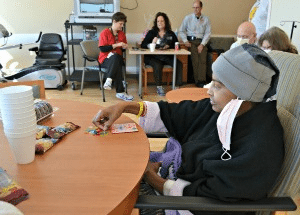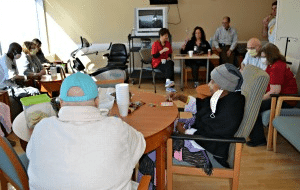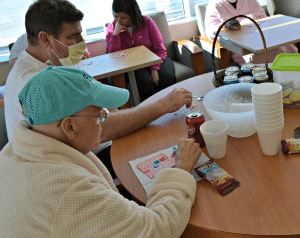Myeloma Patients Enjoy Games, Each Other
| “I’m not sure about this because I’ve never played this game before, but I think I’ve got a bingo,” said Raymonna Jean of Haiti.

Cynthia Crutchifield, a myeloma patient from Kentucky, looks at her bingo card.
The brightly sun-lit lounge area on the seventh floor of UAMS Medical Center erupted with friendly laughter from a roomful of patients and caregivers. “Monna, Monna, Monna,” said fellow multiple myeloma patient Michael Collins of Ohio, smiling as he leaned in to look at her card and confirm her Bingo win. Everyone applauded.
The weekly Bingo games have been going on for a few months on the hospital floor where patients from the UAMS Myeloma Institute for Research and Therapy stay. The games are just one of a regular slate of activities each week — movies, board games and video games — that recently started with the goal of getting patients together, socializing and out of their hospital rooms.
“I think the idea of doing something fun and social has really taken off.”
Cynthia Churchill, a myeloma patient from Lexington, Ky., agreed. “Anything is better than having to be stuck in one room,” she said.

Bingo is one of the weekly activities attracting patients on hospital floor F7.
Churchill said she welcomed the activities and enjoyed visiting with other patients. She was crowned the floor’s Mardi Gras Queen during a party on Fat Tuesday.
Dennis Reeder, a chaplain resident in the UAMS Clinical Pastoral Education Program, said the catalyst for the activities was a conversation he had with Crutchfield. He visited with Heath and other nurses on the floor who helped pull together resources.
The regular activity schedule now includes video games with a Wii console, which has hand controllers with motion sensors that get players moving. In addition there is a movie day featuring popcorn and refreshments and a lineup of movies from animated movies to recent classics like “Secretariat.”

Michael Collins of Ohio and Gail Naimo of Florida join the bingo game.
They’ve served root beer floats and played their own version of the popular TV game show “Family Feud.” Some local restaurants, including Boulevard Bread and Pizza D’Action, have donated food to serve during the activities.
“I’m thrilled with the reaction from our patients. I see the energy I was looking for — see the patients have some sort of normalcy and relaxation,” Reeder said. “I also think it’s been successful because it’s not a contrived situation, it’s very natural, we just get together and have some fun.”
Gail Naimo, a patient from Florida, said the events gave her something to do, staving off the boredom. “I get tired of seeing the same room,” she said.
Heath said the nurses and caregivers have noticed unexpected benefits to the regular activities. “Patients in social situations want to eat. Sometimes we have trouble getting a patient to eat as they should, but when they get together they enjoy the food and treats,” she said.
Lisa Malone, R.N., clinical services assistant manager, said on one occasion a patient retrieved his guitar from his room then led the group in songs. Many patients, caregivers and nurses had tears in their eyes over a stirring rendition of “Amazing Grace,” she said.
Before the bingo game got started, one caregiver poked his head in the room and said he regretted he wasn’t going to be able to stay for the festivities this time, he had an errand to run. He did offer up a couple of jokes that left the room laughing.
“The activities have sometimes created an impromptu patient support group,” Malone said. “Older patients will talk to newer patients, answering questions and offering support.”
Reeder, Heath and Malone believe the activities fit well within the philosophy of patient- and family-centered care. Improving morale and reducing the risk of feeling isolated may well improve patient outcomes.
“There has been a joy in the relationships that have emerged among the patients,” Reeder said. “It’s something that can penetrate any loneliness they might feel and make what might be a tough experience more bearable.”
Churchill won the next bingo game. By the second game, the room had filled with more at least 10 patients playing along with several caregivers.
Winners receive a coffee mug, tube of hand lotion or a similar prize. Reeder said the bingo games have proven to be the most popular with patients, though he also gets stopped by patients from time to time asking what the movie will be that week.
